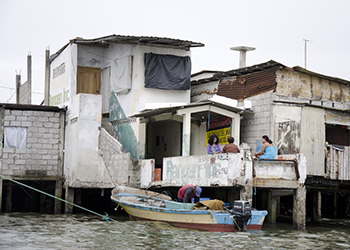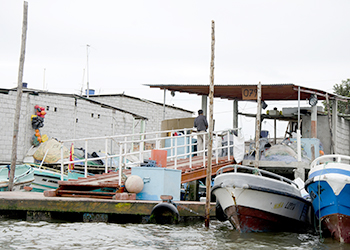Story by Rosa Rodriguez | Country Director | Heifer Ecuador
 Ecuador is blessed to be one of the few “mega-diverse” countries in the world. Much of its population benefits from rich natural resources that come from the coast, Amazon Rainforest, Andes Mountains, and Galapagos Islands. Unfortunately, many of the groups responsible for feeding the country and maintaining its diverse ecosystems, such as smallholder farmers and fishermen, have largely been excluded from the nation’s resources. In the coastal province of El Oro, 90 percent of the 25,000 fishermen live in poverty and a quarter eke by on $50 a month, while the cost of living is $589 a month.
Ecuador is blessed to be one of the few “mega-diverse” countries in the world. Much of its population benefits from rich natural resources that come from the coast, Amazon Rainforest, Andes Mountains, and Galapagos Islands. Unfortunately, many of the groups responsible for feeding the country and maintaining its diverse ecosystems, such as smallholder farmers and fishermen, have largely been excluded from the nation’s resources. In the coastal province of El Oro, 90 percent of the 25,000 fishermen live in poverty and a quarter eke by on $50 a month, while the cost of living is $589 a month.
 These fishermen depend on intermediaries for access to boats, equipment and docks to carry out their trade. Middle men in El Oro charge groups of fishermen $200 a month to use their docks and require them to sell their catch to them for 20 percent under market price. A fisherman might catch 50 pounds of fish, but after selling to the owner of the boat and dock, their profit is only $15-25 to split with each other.
These fishermen depend on intermediaries for access to boats, equipment and docks to carry out their trade. Middle men in El Oro charge groups of fishermen $200 a month to use their docks and require them to sell their catch to them for 20 percent under market price. A fisherman might catch 50 pounds of fish, but after selling to the owner of the boat and dock, their profit is only $15-25 to split with each other.
 Over the last two years, 120 people associated with the cooperative have taken steps to free themselves from exploitative intermediaries. Two now have their own boats and, with the help of Heifer Ecuador, the group was able to purchase a $24,000 dock last May, which they proudly call “Sea and Mangrove.”
Over the last two years, 120 people associated with the cooperative have taken steps to free themselves from exploitative intermediaries. Two now have their own boats and, with the help of Heifer Ecuador, the group was able to purchase a $24,000 dock last May, which they proudly call “Sea and Mangrove.” Members of the cooperative now unload nearly one ton of sea bass, catfish, and cachama every week, and Heifer has begun to facilitate trade with markets in the Andes. Incomes of some fishermen have increased by as much as 65 percent. There's a market demand. Organizing and planning has been carried out. Now they need capital to increase their fleet and extend the dock for additional boats. Motorized boats cost $12,500, so they are saving every penny. We support the perseverance of these fishermen and their families and hope their successes will demonstrate to other fishermen, bank representatives, and government officials that small-scale, sustainable fishing is profitable when exploitative intermediation is properly addressed and credit is made available.
Members of the cooperative now unload nearly one ton of sea bass, catfish, and cachama every week, and Heifer has begun to facilitate trade with markets in the Andes. Incomes of some fishermen have increased by as much as 65 percent. There's a market demand. Organizing and planning has been carried out. Now they need capital to increase their fleet and extend the dock for additional boats. Motorized boats cost $12,500, so they are saving every penny. We support the perseverance of these fishermen and their families and hope their successes will demonstrate to other fishermen, bank representatives, and government officials that small-scale, sustainable fishing is profitable when exploitative intermediation is properly addressed and credit is made available.